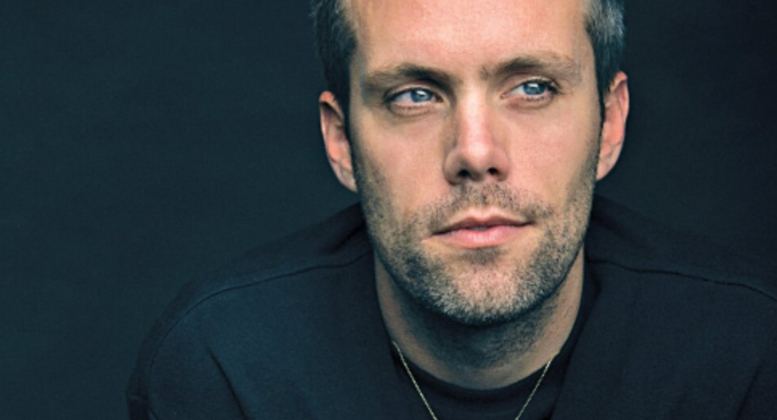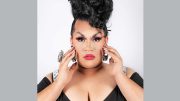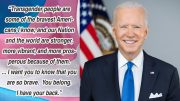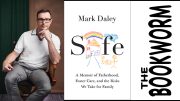Grammy-nominated songwriter on career reinvention
By: Chris Azzopardi*/Special to TRT—
Who needs awards when you have Oprah?
True, walking away with a shiny, golden statue has its own perks, but for songwriter-to-the-stars Justin Tranter, just being nominated for a Grammy and a Golden Globe this year was a triumph. Now, too, he can officially add “sat in the same church as Oprah” to his prolific résumé (OK, whatever, the Beverly Hilton in L.A.) while the queen shook the world with her epic Globes speech in early January.
“I lost and I survived, and had a f#@king blast, and got to watch Oprah’s speech live in person after I lost,” says Tranter, 37. “I could’ve swerved out, but I was having the time of my life.”
Lately, life’s been good to Tranter. Aside from picking up a Song of the Year nod at the Grammys for “Issues,” performed by Julia Michaels, and Best Original Song at the Globes for the Nick Jonas-sung “Home” from the animated fantasy Ferdinand, the former Semi Precious Weapons frontman has amassed four pop radio Top 10s (including Maroon 5’s “Cold” and Halsey’s “Bad at Love”), co-wrote all the original songs on Gwen Stefani’s 2017 Christmas album, and was named BMI Pop Songwriter of the Year 2016.
The wordsmith behind pop behemoths by Kelly Clarkson, Britney Spears, Justin Bieber, Selena Gomez and Kesha recently discussed the “delusion” involved in becoming a pop songwriter, how his queerness helps to nurture his bonds with the female artists he writes for and his mission to give marginalized artists a voice.
When I spoke to Gwen Stefani in 2016 about her This Is What the Truth Feels Like album, she said, “He was so supportive of me and so confident in me, and I had lost a lot of my confidence, so he really brought that out of me.” Do you hear this from other artists you work with?
I do hear that, and it makes me feel amazing – and it makes me feel even better to know that someone like Gwen is saying that to other people too. It’s such an awesome thing to do. After 10 years of my band getting to wear and sing and say and be exactly who I was and do exactly what I wanted to do – my band members were amazing with following my vision for so long – I take really great pride in helping other people feel confident enough to share their truth. Of course, with Gwen, it was the easiest because I’m a Gwen superfan.
Q: I bet you had a blast working with Erika Jayne on “How Many F@cks?”
A: Luckily, Erika and I have a past. We’ve been friends for a minute, and I was like, she’s fierce and she’s fearless and she’s fun, and she deserves the best song someone can give her.
Q: And you knew gay men would be all over that one.
Well, I mean, come on – I was all over it, so hopefully other people in my community would be!
I was driving through Mexico last year with a group of gay friends and the song was on loop.
I love it! And the “see you next Tuesday / number ones, yeah, number ones / I got eight” line? I thought she only had six (dance) number ones, so when I originally tailored that line it rhymed perfectly. “Number ones, yeah, number ones / I got six / so everyone can suck on my d!ck.” But she was like, “Oh no, I have eight number ones.”
Q: Do you think being queer helps you connect with these female artists, who so many gay men revere, in a special way?
A: Being queer has shaped absolutely every single thing I have ever done and helps me understand the underdog point of view, because I am an underdog. A lot of homophobia is based in misogyny, so I can relate to a lot of these things, whether that’s just in terms of writing lyrics or how I work with women. I think we’ve faced similar challenges. I still think in a lot of ways, especially in the professional world, women have it a lot harder than queer men do. But in terms of bullying and feeling ashamed of our sexuality, there’s common ground there.
When I was young, women writers, women artists, women songwriters, women comedians – they’re all I ever cared about. I never really related to the traditional point of view. The experience of being queer helps me relate to marginalized people, but also, I’m just a fan. I just love what women have to say and how they look at the world.
Q: When has that bond been especially strong in the studio?
A: That’s a great question. With Julia and Gwen. And Halsey and I – we worked together very quickly. We only wrote one day together and, luckily, we wrote “Bad at Love,” which turned out to be a great success for both of us. But that song felt really easy. There was the New York bond, and we’re both part of the LGBTQ community. So, when she was working on the lyrics for the first verse using male pronouns, and then in the second verse using female pronouns, of course she knew I wasn’t going to flinch and that I was only going to celebrate that. Julia and Gwen are the ones I’ve written the closest with and spent the most time with writing. And Britney – she knows that I’m a fan, and I think that brings a confidence to the writing and recording sessions. I respect Selena in such a huge away and she knows that.
Q: How would you describe your connection with Britney and how do you think that influenced the upcoming music you’ve written for her?
A: The connection is just fun and it’s sweet and it’s safe, and me and Julia did the best that we could do. With Britney, I was always there with Julia, so I think you have the younger, smart, strong women and you have me and Britney, who are around the same age. So, we just did the best we could to make everybody – not just make her feel safe, she made us feel safe! We’re in the room with a f#@king icon! She’s the icon. We’re just f#@king studio geeks.
Kesha’s another great one. Kesha was so funny, because that’s the first time I’d ever written with someone who I’d been friends with for a really long f#@king time before we worked together. Kesha and I have been friends since 2010 and we wrote together in 2017, so there’s seven years of friendship, which was kind of really cool. We toured together, so we’ve watched each other perform hundreds of times; but we’d never seen how the other one works in a writing session, so that was really amazing.
The day we wrote was two days after I rescued my dog, and we left the session twice to come check on my dog, just to make sure he was OK. I was a new dog mom and Kesha, of course, is a huge animal lover and animal rights activist.
Q: Do you explain to the artists you work with what inspires the songs you write?
A: If the artist wasn’t there during the writing process – if they’re just cutting the song – you kind of have to feel it out because you want the artist to make it their own.
Q: What’s the most personal song you’ve written about your life that somebody else ended up singing?
A: Wow, I don’t think I’ve ever been asked that question before. Early on, “Nostalgic” by Kelly Clarkson was very much about me and an ex-boyfriend. That was super-duper personal and a crazy moment. I sang the demo on that one, and so I was listening to my demo of that for a year, and then I went to the RCA offices in New York to hear Kelly’s version. I was very new in my pop songwriter career and I started crying (laughs). It was just so cool because her voice is so good. I got to sit next to her at the Golden Globes, so that was a really cool full circle moment.
“Centuries” is really personal to me, but not my life, if that makes sense. It was inspired by a short documentary with (African-American gay liberation activist) Marsha P. Johnson I was watching on YouTube and the lyric “you’ll remember me for centuries” came to mind. I was really clearly setting out to make it a sports anthem because I was thinking of Freddie Mercury writing all these huge sports anthems, and I was like, “Oh, there’s something about the queer and underdog perspective that really works in that literal arena.”
So, I set out to write this song where the main lyric was inspired by Marsha and have it be a sports anthem. Before the song even came out, it was confirmed to be a college football theme song, so it was pretty amazing that it was this very specific moment about Marsha P., the queen of the LGBTQ rights movement, but I wanted it to be a sports anthem. Fall Out Boy wrote their own verses and they wrote the bridge and did all that themselves without us there, so obviously the song became something different for them, which is beautiful and that’s the whole point. I think it’s so funny blogs talk shit, like, “Oh, there’s five writers on this song or there’s seven writers on this song,” and it’s like, “No, that’s just cool.” Collaboration is cool. A movie literally takes 1,000 people to make and we’re not mad at them.
Q: I read recently you’re a Patty Griffin fan, and considering you write pop songs, I didn’t expect you to name-drop her.
A: Patty Griffin is one of the greatest songwriters of all time. If people aren’t name-dropping Patty Griffin, they’re not listening to songs.
Q: You recently signed Shea Diamond, a trans woman of color, to your record label. Are you making it your personal mission to bring more queer musicians into the fold?
A: Of course it’s more queer people, but it’s also just people whose voices aren’t normally heard, so whether that means more young women, LGBTQ people, racial minorities – whatever it means, I just want to give as many marginalized people a voice as I possibly can. I feel like if we’re not paying our privilege forward, then what’s the f#@king point?
Q: Regarding your Golden Globe and Oscar nominations, is it really an honor just to be nominated?
A: It really is an honor just to be nominated. I’d kind of written it off. I had all these huge dreams, but I’d said being nominated for those big awards wasn’t part of my dream because the chances are so slim. And being a BMI Pop Songwriter of the Year in our community is kind of the highest honor, so I thought I’d already done it. Then to wake up and there’s the Grammy nominations, and then to wake up a couple of weeks later and there’s the Golden Globe nominations, it was like, “What the f@ck is happening?” It was crazy.
Q: So, no Semi Precious Weapons anymore?
A: Correct.
Q: Do you see yourself being in a band again?
A: No, I don’t see myself being in a band again. I don’t see myself releasing my own music anymore. I’m just having so much fun, and it’s just so cool to help other people tell their stories and focus their visions into something great. I’m loving it. And if I ever do perform again, I’ll come up with some weird way to do it, like write myself a rock opera.
Q: Besides Stevie Nicks, which other gay icons would you want to work with?
A: I would kill to work with Beyoncé, obviously. That would be insanity. Madonna would be insanity. Elton would be insanity. There are so many. And I’ve gotten to work with Gwen, which is a dream come true, and I’ve gotten to work with Courtney Love, which is a dream come true.
It’s funny: We all have these ideas of what our dream come true is and then some crazy $hit happens, and everything completely changes, and a different dream comes true, and you realize it’s what you always wanted but you didn’t know.
I always say everything’s meant to be as long as you don’t quit. If I would’ve quit when the band thing had reached its end, none of this would’ve happened. Luckily, I’m a crazy person and delusional and was convinced that if I just kept writing, something good would happen and it did.
Q: Or you could say you were really determined.
A: At 34 years old, to completely reinvent what I’m gonna do in this industry, I think that definitely took some delusion. In creative fields, most people give up a lot earlier. It was more than determination. It was definitely a delusion.
*As editor of Q Syndicate, the international LGBTQ wire service, Chris Azzopardi has interviewed a multitude of superstars, including Meryl Streep, Mariah Carey and Beyoncé. Reach him via his website at www.chris-azzopardi.com and on Twitter (@chrisazzopardi).







